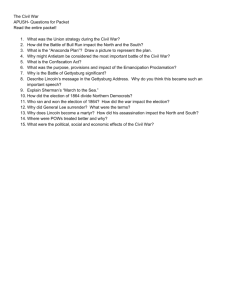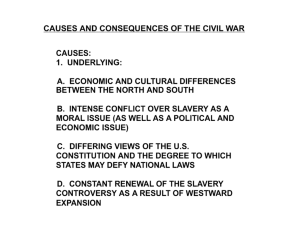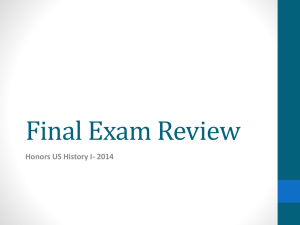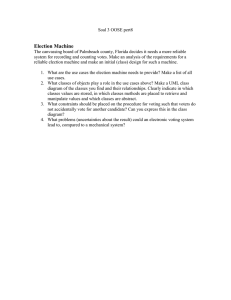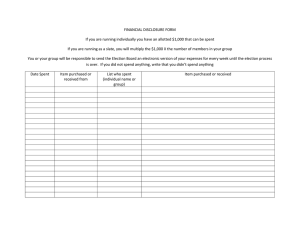The Election That Saved A Nation Oct. 30, 2014 Peter Wood
advertisement
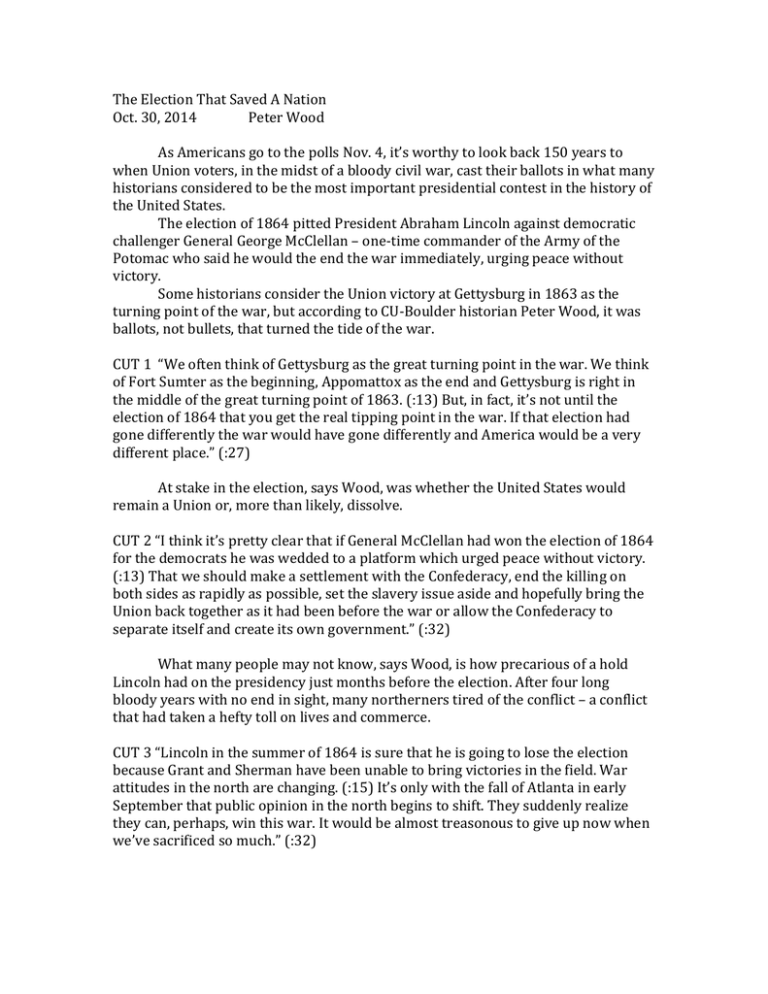
The Election That Saved A Nation Oct. 30, 2014 Peter Wood As Americans go to the polls Nov. 4, it’s worthy to look back 150 years to when Union voters, in the midst of a bloody civil war, cast their ballots in what many historians considered to be the most important presidential contest in the history of the United States. The election of 1864 pitted President Abraham Lincoln against democratic challenger General George McClellan – one-time commander of the Army of the Potomac who said he would the end the war immediately, urging peace without victory. Some historians consider the Union victory at Gettysburg in 1863 as the turning point of the war, but according to CU-Boulder historian Peter Wood, it was ballots, not bullets, that turned the tide of the war. CUT 1 “We often think of Gettysburg as the great turning point in the war. We think of Fort Sumter as the beginning, Appomattox as the end and Gettysburg is right in the middle of the great turning point of 1863. (:13) But, in fact, it’s not until the election of 1864 that you get the real tipping point in the war. If that election had gone differently the war would have gone differently and America would be a very different place.” (:27) At stake in the election, says Wood, was whether the United States would remain a Union or, more than likely, dissolve. CUT 2 “I think it’s pretty clear that if General McClellan had won the election of 1864 for the democrats he was wedded to a platform which urged peace without victory. (:13) That we should make a settlement with the Confederacy, end the killing on both sides as rapidly as possible, set the slavery issue aside and hopefully bring the Union back together as it had been before the war or allow the Confederacy to separate itself and create its own government.” (:32) What many people may not know, says Wood, is how precarious of a hold Lincoln had on the presidency just months before the election. After four long bloody years with no end in sight, many northerners tired of the conflict – a conflict that had taken a hefty toll on lives and commerce. CUT 3 “Lincoln in the summer of 1864 is sure that he is going to lose the election because Grant and Sherman have been unable to bring victories in the field. War attitudes in the north are changing. (:15) It’s only with the fall of Atlanta in early September that public opinion in the north begins to shift. They suddenly realize they can, perhaps, win this war. It would be almost treasonous to give up now when we’ve sacrificed so much.” (:32) Wood says another fascinating aspect of the election of 1864 is that it happened in the first place, which insured that the democratic process would continue on despite the war. CUT 4 “That’s probably the most amazing thing about the election of 1864. It didn’t even have to happen at all. Lincoln could have declared marshal law and said, ‘As long as there is a civil war being conducted we’ll postpone any presidential election until the war is over.’ (:16) He felt that would have been a psychological victory for the Confederacy. He felt that Democracy really had to follow through on this tradition and that set a huge precedent.” (:28) Lincoln won the election easily with 55 percent of the vote. 22 out of 25 states ended up supporting him. An amazing turnaround, says Wood, when six months earlier it had looked almost the opposite way. -CU-
